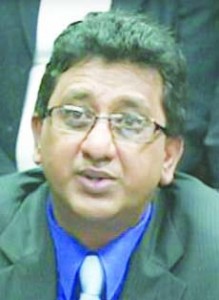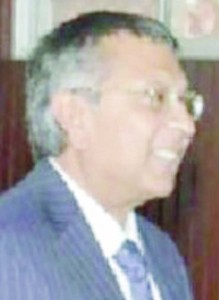
Members of the legal fraternity in Guyana have weighed in on the Rabi Sukul controversy, describing the incident as unfortunate and a slap in the face of the country’s judicial integrity.
Legal Affairs Minister and Attorney General Anil Nandlall when asked whether the court matter involving Sukul was ongoing in the UK at the time he was appointed as a judge at the Court of Appeal in Guyana last July, Nandlall said “it appeared so”.
The attorney general explained that the appointment of judges is done by the president, based upon recommendations by the Judicial Service Commission.
“The Judicial Service Commission is an independent body under the Constitution and they are supposed to conduct all the background checks when making recommendations for appointments,” he stated.
On this note, Nandlall directed all further questions on the Sukul issue to the commission. Nevertheless, he noted that it is expected that the commission recommends persons who are fit to hold a high office of a judge or, as in this instance, an appeal judge.

The attorney general explained that when a first recommendation is made to the president, and he does not find favour with it, he returns it to the commission for reconsideration.
He noted that if after the reconsideration, the commission still recommends the same person to the president; the president will be obliged to concur with the decision.
However, the minister said that this was not the case with Sukul, pointing out that the president had accepted the recommendation for him.
“Sukul’s recommendation was accepted at first because his application to the Judicial Service Commission (JSC) was supported by the recommendations of distinguish people in the legal fraternity in the United Kingdom,” he explained.
Efforts by this newspaper to contact the chancellor of the judiciary for a comment proved futile.
Surprised
Guyana Bar Association (GPA) President, Attorney Ronald Burch-Smith said he is surprised to learn about the situation. The attorney highlighted that the former judge was recently appointed and the association is concerned about whether at the time of his appointment the matter was already in progress and he intentionally withheld it from the Judicial Service Commission.
This, Burch-Smith said, is a matter of concern for the bar association. He questioned whether the commission was aware of Sukul’s matter in the UK or had requested information from the UK authorities on Sukul’s character. “These are relevant questions I intend to address with the JSC,” he stated.
However, Burch-Smith acknowledged that the acting chancellor acted swiftly by asking for Sukul’s resignation after confirming his disbarment in the UK.
“So there was no ambiguity and he seemed to have been taken by surprise by this entire situation,” GBA president noted.
Sukul was disbarred from practice in the UK by the Bar Council of England and Wales for misleading his client by drafting false grounds of appeal. According to the Law Society Gazette, the bar’s disciplinary tribunal heard that Sukul, who was with the Balham Chambers in London, drafted a document to the Court of Appeal setting out initial grounds for an appeal against conviction on behalf of his client, who was convicted of drugs-related offences.
The tribunal found he had created the document, knowing it to be false, with the intention of misleading his client into believing he had grounds to appeal his conviction, when Sukul knew there were no grounds of appeal.
The five-person tribunal, chaired by Michael Baker, QC, found unanimously that Sukul had intentionally misled his client and engaged in conduct likely to bring the legal profession into disrepute. Sukul was ordered to be disbarred in the UK; however, that decision is open to appeal.



